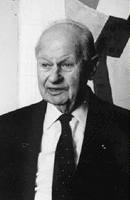

|
French composer and conductor (b. June 18, 1904, Paris, France—d. June 5, 2003, Paris), championed modern composers, notably Jacques Offenbach, Igor Stravinsky, Olivier Messiaen, and Maurice Ravel, who took Rosenthal on as his third and last composition student in 1926 and who remained a close friend. Rosenthal was principal conductor of the French National Orchestra (1944–47), the Seattle Symphony (1948–51), and the Liège Symphony Orchestra (1964–67) and was professor of conducting (1962–74) at the Paris Conservatory. His best-known composition, Gaîté Parisienne (1938), a ballet suite based on music by Offenbach, remained a favourite with ballet companies, orchestras, and audiences around the world. Rosenthal was made a Commander of the Legion of Honour and of the Order of Merit. |
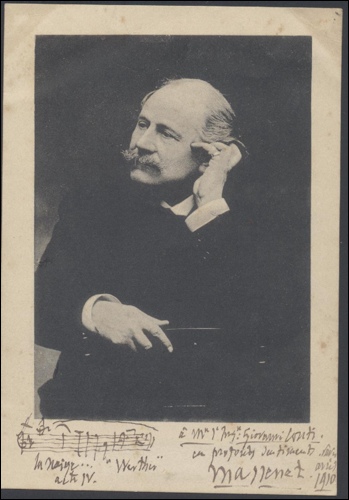 BD: So Massenet was innovative?
BD: So Massenet was innovative?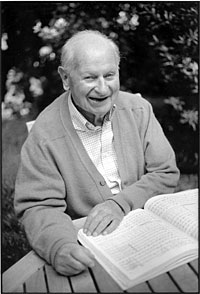 MR: My personal habit is to be there from the beginning of the
rehearsal period. I go not only to all the coaching sessions with the
singers, but also to all the staging sessions. It’s not that I distrust
the stage-director or the coaches, but I want to be there in order to keep
bad habits from slipping in. Sometimes when they are learning different
stage movements, they are losing the tempo of the music. It’s so easy
to keep bad habits, and in this way I am always there. I don’t say
anything to the stage-director except when he tries to do something that
goes against the music. If the director attempts something that would
prevent the singer from singing in the right tempo, I would tell him it’s
not possible, or that it would disturb the singer to do that. So, he
has to find another way.
MR: My personal habit is to be there from the beginning of the
rehearsal period. I go not only to all the coaching sessions with the
singers, but also to all the staging sessions. It’s not that I distrust
the stage-director or the coaches, but I want to be there in order to keep
bad habits from slipping in. Sometimes when they are learning different
stage movements, they are losing the tempo of the music. It’s so easy
to keep bad habits, and in this way I am always there. I don’t say
anything to the stage-director except when he tries to do something that
goes against the music. If the director attempts something that would
prevent the singer from singing in the right tempo, I would tell him it’s
not possible, or that it would disturb the singer to do that. So, he
has to find another way.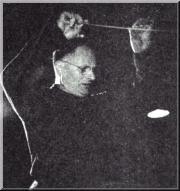 MR: No one is the ideal director or conductor or performer of
these works. I am sure that I’m not the best one, but, you know, when
others conduct my works it is very disturbing for me to hear it conducted
in another way. All the conductors in the world that have a name
have done my Gaîté Parisienne
and every time, it’s another work. I listen and say here and there,
“Oh, I didn’t think about that!”
MR: No one is the ideal director or conductor or performer of
these works. I am sure that I’m not the best one, but, you know, when
others conduct my works it is very disturbing for me to hear it conducted
in another way. All the conductors in the world that have a name
have done my Gaîté Parisienne
and every time, it’s another work. I listen and say here and there,
“Oh, I didn’t think about that!”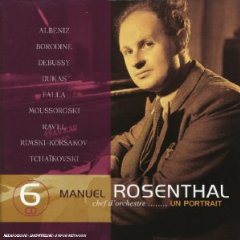 MR: Yes. A recording is never really perfect – or rather
it is too perfect. Nobody plays or sings like in a recording.
You never hear mistakes on recordings (except for “live” recordings), but
mistakes happen in performances all the time, and that’s more human.
And during a performance, the performer goes with the public and the public
goes with him. They are together.
MR: Yes. A recording is never really perfect – or rather
it is too perfect. Nobody plays or sings like in a recording.
You never hear mistakes on recordings (except for “live” recordings), but
mistakes happen in performances all the time, and that’s more human.
And during a performance, the performer goes with the public and the public
goes with him. They are together.
Manuel RosenthalRavel's last pupil and France's most important conductor Wednesday, 11 June 2003
Manuel Rosenthal was one of the last living links with the musical Paris of the 1920s and 1930s, the Paris that was the home of Igor Stravinsky, that boasted Maurice Ravel - Rosenthal's teacher and friend - and hosted Sergei Diaghilev. For almost 70 years Rosenthal was France's most important conductor, fearlessly introducing modern music to reluctant audiences. And, although his name reached a wider public largely through the Offenbach orchestrations that formed his 1938 ballet Gaîté Parisienne, he was the composer of a substantial and distinguished body of music. Manuel Rosenthal, conductor and composer; born Paris 18 June 1904; twice married (two sons); died Paris 5 June 2003. Rosenthal's beginnings were hardly auspicious. Born in 1904, the illegitimate son of a Russian woman and a propertied society figure, Manuel never knew his real father (though, aged 10, he once went to see where he lived, on a large estate at Saint-Cloud, west of Paris); his surname came from his stepfather. But his mother, Anna Devorsosky, was no ordinary woman: beginning in 1885, she had walked from Moscow to Vienna to escape the anti-Semitic pogroms, travelled to Palestine, where she married a pharmacist, walked back to Italy, and caught a train to Paris - she was a tough lady, and Manuel inherited something of that toughness. His career took a number of unpredictable turns. His principal childhood interest was literature, and it was thought he might become a writer. But, like many young Jewish children, he was also taught the violin, beginning when he was six. So, when his stepfather died in 1918, on the day of the Armistice itself, and he found himself, at 14, head of the household, it was to the violin that he looked to feed his mother, sister and himself, and he earned a living playing in the theatre orchestras, café ensembles and other such groups, then commonplace all over Paris. The violin seem to offer Rosenthal a career and so, at 16, he entered the Conservatoire as a violinist, though more out of a sense of obligation - at home he was discovering the pleasure of composing. When at the end of his first term a piece was required for a sight-reading exam, Rosenthal wrote a Sonatine for two violins and piano, and thought no more about it. Jules Boucherit, his violin teacher, was impressed and sent the score off to the Société Musicale Independante - one of the two main chamber-music societies, with a committee composed of such luminaries as Stravinsky, Ravel, Béla Bartók and Sergei Prokofiev. A few weeks later Rosenthal received a letter telling him that his Sonatine would be performed at the SMI's 100th concert and at first assumed that someone was playing a practical joke on him. The reaction to the performance of his sonatina changed his life: Everyone whistled and shouted; it was a terrible noise. So you can imagine that I was as pleased as Punch! When you're 17 and you do something you don't think much of (it wasn't anything serious for me) and they play it in public - and the hall was stuffed full because it was the 100th concert . . . People were shouting, "He's mad!" Well, that was really amusing! I thought: it's great fun, music! A publisher took a shine to the Sonatine, and Rosenthal sent copies of that and other pieces to anyone he thought might be interested, or useful, including Ravel - who reacted with silence. At that point he was called up for national service and spent the next two years in uniform. On leave in Paris, he was invited to dinner by the pianist Madeleine d'Aleman, who arrived an hour later, explaining that she had been out at Montfort-l'Amaury, Ravel's home, accompanying Ravel songs to their composer. When she turned down an invitation to stay for dinner, Ravel asked why and, hearing Rosenthal's name, asked d'Aleman to apologise for his lack of response and to tell Rosenthal he was going to study with him. Since Ravel had had only two students before, Maurice Delage and Jean Huré (later Rosenthal's teacher of fugue and counterpoint), Rosenthal could hardly believe his luck. He duly became the third and last of Ravel's students and, over the remaining 11 years of Ravel's life, a close friend. Ravel's teaching methods could be severe. Rosenthal once proudly turned up with a fugue in which, he thought, he had finally found his voice. Ravel read it through silently, picked it up, ripped it into pieces and threw the fragments into the fireplace. Rosenthal watched, horrified, then grabbed his coat and stormed out into the pouring rain. He was sitting in the train, waiting for it to return to Paris, when there came a tap on the window. Ravel, standing the downpour, asked, "So you don't say goodbye to your teacher?" - and Rosenthal understood that he had his best interests at heart. It was Ravel who was responsible, in 1928, for Rosenthal's conducting début, arranging for the Concerts Pasdeloup to put on an evening of Rosenthal's own music and insisting that the composer conduct. Rosenthal, who had never mounted the podium before, was beside himself with fear, but the results impressed Désiré-Emile Inghelbrecht and Rhené-Baton, the two most prominent French conductors of the day, who came backstage at the interval. "How long have you been conducting?" Inghelbrecht asked. "About an hour," Rosenthal answered. Inghelbrecht thought enough of Rosenthal to appoint him his assistant when the Orchestre National de France was founded in 1934, although the relationship was fraught with tension: Rosenthal felt that he was being used as a dogsbody. But there were advantages, as when he assisted Arturo Toscanini in two concerts in 1934. He continued to compose, largely chansons for various shows - and, to his later regret, marrying a chorus girl (a Mlle Troussier, in 1927) from one of them. Two operettas, Les Bootleggers (1932) and La Poule noire (1934-37), failed to generate much enthusiasm; a symphonic suite inspired by Joseph Delteil's Jeanne d'Arc (1934-36) showed a tougher creative character, and was followed by the oratorio St François d'Assise in 1937. Rosenthal's breakthrough as a conductor came in 1936, when the Radio PTT - the forerunner of Radio France - set up its own orchestra and appointed him to its head. He now began a tireless crusade on behalf of contemporary music, conducting Ravel of course (though he had only a year to live) as well as Stravinsky, Bartók and other "difficult" composers - and Rosenthal's sharp tongue meant that he, too, could sometimes be difficult. His championship of Stravinsky was soon to stand him in good stead. Roger Désormière, lacking time to undertake a commission, asked Rosenthal to take it on - the orchestration of a series of Offenbach numbers to form a ballet. Rosenthal reluctantly complied, only to find his score turned down by Leonid Miasine - Massine, the choreographer. He then suggested bringing in an arbitrator and proposed Stravinsky: I asked him and he was good enough to say: "Since it is you who ask me, I'm happy to do it." So we go to his place with Miasine; the score is played to him - and Stravinsky takes Miasine by the collar, takes him toward the door of his flat and says: "But listen, that's marvellous - Leonid, if you turn this score down, you will probably turn down the biggest success of your career." The subsequent worldwide success of Gaîté Parisienne was to assure Rosenthal a decent income for the rest of his career - though some hard years were yet to come. Turning down an invitation from Serge Koussevitzky to join him at the Boston Symphony Orchestra, at the outbreak of the Second World War Rosenthal signed up, becoming a medical corporal, and was captured, spending nine months, in 1940-41, in captivity. On repatriation, as a Jew and now a member of the Resistance, he spent his time on the run from the police. He was composing all the while, using music to buoy up his spirits, as in the orchestral showpiece Musique de table: My wife was ill in hospital, I had nothing to eat, I was all on my own, sad. And then all of a sudden the musician's imagination begins to work. I said to myself, this is the moment to act as if there were a huge meal. It was a tradition of Louis XIV, the musique pour les soupers du Roi of Delalande. So I imagined an enormous supper in the form of a concerto for orchestra. It's the most savant of my works! With the Liberation, Rosenthal took over the conductorship of the Orchestre National, continuing his missionary work on behalf of new music. In 1947 an invitation from Jack Hilton brought him and his orchestra to join Sir Thomas Beecham and his, the Royal Philharmonic, in a concert that filled the Harringay Arena with 13,500 listeners. In 1948 he was appointed chief conductor of the Seattle Symphony Orchestra, multiplying the number of subscribers tenfold in his first season. But his tenure lasted only until 1951, when the prudish orchestral authorities discovered that the second "Mme Rosenthal", the soprano Claudine Verneuil, was not legally his wife and terminated his contract. Not until the following year did he divorce his first wife, leaving him and Claudine free to marry at last. He spent much of the next few years working as a guest conductor, in North and South America, mainland Europe and the Nordic countries, the Middle East. In 1962 he became professor of conducting at the Paris Conservatoire, retaining the post until 1974; and a 1964 appointment saw him chief conductor of the orchestra in Liège for three years. Before his very last years, when his sight began to go, old age hardly seemed to touch him. In his seventies he was a frequent visitor to North America, attracting especial praise for a triple bill of Satie's Parade, Poulenc's Les Mamelles de Tirésias and Ravel's L'Enfant et les sortilèges at the Metropolitan Opera in New York in 1981. He was 83 when he first conducted Wagner's Ring cycle, back in Seattle. In 1988 he introduced Debussy's Pelléas et Mélisande to a Russian audience. And his third recording of Gaîté Parisienne was made when he was 92. He was 93 when he told me: I could go on conducting, though my right leg is dragging a bit. But you have to finish some time or other and let the young folk have their chance. Rosenthal closed his career crowned in glory, regularly visited by researchers wanting to ask about the great names with whom he had rubbed shoulders almost a century before. He took some solace in the gradual rediscovery of his own music, though was peeved that it was the lighter scores that tended to attract attention. His 13 orchestral scores - among them a symphony, from 1949 - await regular performance, as do the five for chorus and orchestra, although the style, something akin to Poulenc with teeth, would certainly appeal to a wide audience. His response to the observation that his music was very French could have come from Ravel: Yes, but it was none of my doing - it just happened. I like things to be claire and I am, I think, quite formal. You should always know why you are doing what you are trying to do . . . A great musician must be careful to be himself. Martin Anderson |
This interview was recorded on the telephone on September 9, 1985.
Portions were used (along with recordings) on WNIB in 1985, 1994 and 1999.
This transcription was made in 1986 and published in the Tenth Anniversary
Edition of The Massenet Newsletter
in January, 1987. It was slightly re-edited and updated, and was posted
on this website in August of 2008.
To see a full list (with links) of interviews which have been transcribed and posted on this website, click here. To read my thoughts on editing these interviews for print, as well as a few other interesting observations, click here.
Award - winning broadcaster Bruce Duffie was with WNIB, Classical 97 in Chicago from 1975 until its final moment as a classical station in February of 2001. His interviews have also appeared in various magazines and journals since 1980, and he now continues his broadcast series on WNUR-FM, as well as on Contemporary Classical Internet Radio.
You are invited to visit his website for more information about his work, including selected transcripts of other interviews, plus a full list of his guests. He would also like to call your attention to the photos and information about his grandfather, who was a pioneer in the automotive field more than a century ago. You may also send him E-Mail with comments, questions and suggestions.